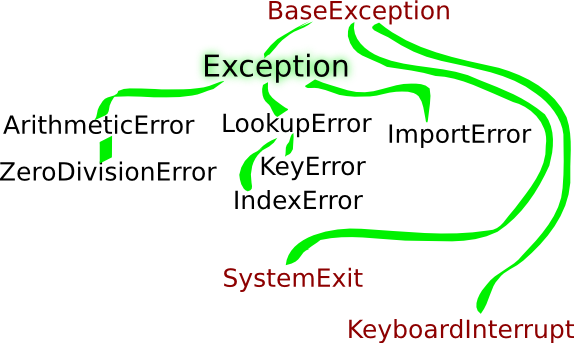Advanced Python
Contents
- A plan
- Decorators
- Decorators
- The decorator syntax
- A decorator doing smth. …
- … written as a class
- Installing function wrappers
- Decorators can be stacked
- Example: deprecated2
- Example: deprecated2
- Raison d'être for decorators
- Mention of class decorators
- Example: plugin registration system
- Problems with decorators thus defined
- Exceptions
- Exception handling
- Philosophical interludium
- Going further than try/except
- Multiple finally levels
- For completeness: else
- Why are exceptions good?
- Context Managers
- Context Manager Protocol
- Example
- Motto “batteries included”
- Motto “batteries included”
- Exceptions and context managers
- Generators
- Generators
- Communication is bi-directional!
- Communication
- Communication
- Aggravated communication
- Synthesis
- The return of the decorator
- Example: flushed
- Example: testing exceptions
- Example: testing exceptions, ctd.
- Python 3
- Python 3
- Conversion
Examples are in Python 3!
©2010, CC BY-SA 3.0 (source code available)
Press ‘t’ to toggle presentation/outline mode.
A plan
- decorators
- exception handling
- generators
- context managers
- py3k if time.now() - 10:30 < 0
After the lecture, some people complained that this was 'a dive in cold water' and that no introduction and not enough motivation was given. To make up for this deficiency, in the following paragraphs I'll try to convince you, the reader, that the presented techniques are actually useful, and that they help the programmer follow the Zen of Python.
The most important Python principle (import this) is DRY: don't repeat yourself. Decorators and context managers allow one to extract common parts of the code — function or class decoration and try/except/finally clauses — and to put them in a seperate location.
Another part of the Zen of Python is explicit is better than implicit. The lengthy discussion on python-dev was caused by the desire to make the job of decoration simple, without repetitions, but visible when looking at the function header. Therefore decorator syntax puts the decorator in a line next to the function definition, so it's hard to miss, and on the outside because the decorator actually wraps the object, and thus this is the natural order which helps readability.
The Zen of Python also tells the programmer that flat is better than nested and readability counts. Decorators, generators, and context managers are all about splitting a complicated structure into two or more functions or classes, with each part performing a single job.
Of course one might argue that the rule simple is better than complex goes against the techniques described here, since they cannot really be said to be simple, maybe with the exception of generators. But once the decorator or context manager is defined, using it is simple. The defintion is indeed complex, but not complicated, once the rules are understood. I would also argue, that those techniques do have inherent beauty, and beautiful is better than ugly.
Decorators

|
Bruce Eckel photo: freefoto.com CC ND-NC-SA 3.0 |
Decorators
- decorators? : passing of a function object through a filter + syntax
- can work on classes or functions
- can be written as classes or functions
- nothing new under the sun ;)
- function could be written differently
- syntax equivalent to explicit decorating function call and assignment
- just cleaner
The decorator syntax
def deco(orig_f):
print('decorating:', orig_f)
return orig_f
@deco
def func():
print('in func')
|
def func():
print('in func')
func = deco(func)
|
A decorator doing smth. …
… to remember the author and protect the V.I.I.P.
>>> @author('J.R.P.')
... def func(): pass
>>> func.author
'J.R.P.'
-
# old style >>> def func(): pass >>> func = author('Joe…')(func) >>> func.author 'Joe…'
… written as a class
set an attribute on the function
class author:
def __init__(self, name):
self.name = name
def __call__(self, function):
function.author = self.name
return function
The same written as nested functions:
def author(name):
def helper(orig_f):
orig_f.author = name
return orig_f
return helper
Installing function wrappers
class deprecated:
"Print a deprecation warning once"
def __init__(self):
pass
def __call__(self, func):
self.func = func
self.count = 0
return self.wrapper
def wrapper(self, *args, **kwargs):
self.count += 1
if self.count == 1:
print(self.func.__name__,
'is deprecated')
return self.func(*args, **kwargs)
def deprecated__f(func):
"""Print a deprecation warning once
Installs a wrapper function which
prints a warning on first function use.
>>> @deprecated__f
... def f():
... pass
>>> f()
f is deprecated
"""
count = 0
def wrapper(*args, **kwargs):
nonlocal count
count += 1
if count == 1:
print(func.__name__, 'is deprecated')
return func(*args, **kwargs)
return wrapper
Decorators can be stacked
@author('J.P.R.')
@depreacted()
def func(): pass
|
# old style
def func(): pass
func = author('J.P.R.')(
deprecated(func))
|
Example: deprecated2
Modify deprecated to take a message to print.
>>> @deprecated2('function {func.__name__}'
... ' is deprecated')
... def eot(): return 'EOT'
>>> eot()
function eot is deprecated
'EOT'
>>> eot()
'EOT'
Example: deprecated2
class deprecated2:
def __init__(self, message):
self.message = message # ⇜
def __call__(self, func):
self.func = func
self.count = 0
return self.wrapper
def wrapper(self, *args, **kwargs):
self.count += 1
if self.count == 1:
fmt = self.message.format # ⇜
print(fmt(func=self.func)) # ⇜
return self.func(*args, **kwargs)
The same written as a function.
def deprecated2(message):
"""
>>> @deprecated2('function {func.__name__} is deprecated')
... def eot(): return 'EOT'
>>> eot()
function eot is deprecated
'EOT'
"""
def _deprecated(func):
count = 0
def wrapper(*args, **kwargs):
nonlocal count
count += 1
if count == 1:
print(message.format(func=func))
return func(*args, **kwargs)
return wrapper
return _deprecated
Raison d'être for decorators
class K:
def do_work(self, *args):
pass
@classmethod
def create(cls, *args):
return cls(*args)
@staticmethod
def method(*args):
return 33
Mention of class decorators
same principle
much less exciting
Example: plugin registration system
class WordProcessor:
PLUGINS = []
def process(self, text):
for plug in self.PLUGINS:
text = plug().cleanup(text)
return text
@register(WordProcessor.PLUGINS)
class CleanMdashesExtension():
def cleanup(self, text):
return text.replace('—',
'\N{em dash}')
Problems with decorators thus defined
| tracebacks | introspection | |
repetition
|
Solutions
functools.update_wrapper(wrapper, wrapped) "Update a wrapper function to look like the wrapped function"
module decorator
- PEP 318 (function and method decorator syntax)
- PEP 3129 (class decorator syntax)
- http://wiki.python.org/moin/PythonDecoratorLibrary
- http://docs.python.org/dev/library/functools.html
- http://pypi.python.org/pypi/decorator
- Bruce Eckel
- Decorators I: Introduction to Python Decorators
- Python Decorators II: Decorator Arguments
- Python Decorators III: A Decorator-Based Build System
Exception handling
try:
1/0
except ZeroDivisionError as description:
print('got', description)
return float('inf')

Philosophical interludium
CHANGES = list()
def remove_change__a(change):
if change in CHANGES:
CHANGES.remove(change)
|
L B Y L |
def remove_change__b(change):
try: CHANGES.remove(change)
except ValueError: pass
|
E A F P |
CHANGES = list(range(10**7))
r(10**7); r(10**7-1); r(10**7-2)
|
|
r = remove_change__a() r = remove_change__b() |
⟿ 1.46s ⟿ 0.85s |
Going further than try/except
how to make sure resources are freed?
def add_user(login, uid, gid, name, home,
shell='/bin/bash'):
fields = (login, str(uid), str(gid),
name, home, shell)
f = open(PASSWD_FILE, 'a')
fcntl.lockf(f.fileno(), fcntl.LOCK_EX)
try:
f.seek(0, io.SEEK_END)
f.write(':'.join(fields) + '\n')
f.flush()
finally:
fcntl.lockf(f.fileno(), fcntl.LOCK_UN)
Multiple finally levels
try:
try:
print('work')
{}['???']
finally:
print('finalizer a')
1 / 0
finally:
print('finalizer b')
Nesting of finally levels is required if we want to make sure that all finalization statements are executed. When more than one statement is written in the same clause, an exception thrown by one of the staments would prevent the following ones from running. Putting each part in a seperate level makes sure that all parts are run independently.
For completeness: else
another less well-known thing that can dangle after a try clause…
try:
ans = math.sqrt(num)
except ValueError:
ans = float('nan')
else:
print('operation succeeded!')
Why are exceptions good?
#strip_comments.py
import sys
inp = open(sys.argv[1])
out = open(sys.argv[2], 'w')
for line in inp:
if not line.lstrip().startswith('#'):
print(line, file=out)
A meaningful error message when:
- not enough arguments
- files cannot be opened
Context Managers

Context Manager Protocol
with manager as var:
do_something(var)
var = manager.__enter__()
try:
do_something(var)
finally:
manager.__exit__()
Example
make sure output is written to file from buffers
with flushed(open('/etc/fstab', 'a')) as f:
print('/dev/cdrom /cdrom', file=f)
os.system('mount /cdrom')
class flushed:
def __init__(self, obj):
self.obj = obj
def __enter__(self):
return self.obj
def __exit__(self, *args):
self.obj.flush()
Motto “batteries included”
with open(filename) as f:
f.write(...)
- all file-like objects:
- file ➔ automatically closed
- fileinput, tempfile (py>=3.2)
- bz2.BZFile, gzip.GZFile, tar.TarFile, zip.ZipFile
- ftplib ➔ close connection (py>=3.2)
Motto “batteries included”
- locks
- multiprocessing.RLock ➔ automatically unlock
- multiprocessing.Semaphore
- memoryview ➔ automatically released (py>=3.2)
- decimal.getlocalcontext ➔ precision
- winreg.HKEY ➔ open and close key
- warnings.catch_warnings ➔ kill warnings
- contextlib.closes
Exceptions and context managers
An exception thrown in the with-block is given to __exit__. If __exit__ returns True, the exception is swallowed. Otherwise, the exception is rethrown after exiting all context managers.
Taken from py.test and unittest.TestCase.
with assert_raises(KeyError):
{}['foo']
class assert_raises:
def __init__(self, type):
self.type = type
def __enter__(self):
pass
def __exit__(self, type, value, traceback):
if type is None:
raise AssertionError('no exc.')
if issubclass(type, self.type):
return True
raise AssertionError('wrong exc.') from value
Generators

|
Generators
>>> def words():
... print('generator running…')
... yield 'gugu'
... yield 'bebe'
... return
>>> source = words()
>>> for word in source:
... print('\N{rightwards arrow}', word)
generator running…
→ gugu
→ bebe
Communication is bi-directional!
- generator can yield and raise
- the caller can throw, send, and close
Communication
>>> def generator():
... print('executing …', end=' ')
... yield 'X'
... Z = yield 'Y'
... print('got', ans, '…', end=' ')
>>> g = generator()
>>> ans = next(g); print(ans)
executing … X
>>> ans = next(g); print(ans)
Y
Communication
>>> def generator():
... print('executing …', end=' ')
... Z = yield; print('got', Z, '…', end=' ')
... Z2 = yield; print('got', Z2)
>>> g = generator()
>>> ans = next(g); print(ans)
executing … None
>>> ans = g.send('Z'); print(ans)
got Z … None
Aggravated communication
>>> def strange():
... try:
... yield 'good'
... except Exception as e:
... yield 'bad'
... yield 'done'
>>> gen = strange()
>>> next(gen)
'good'
>>> gen.throw(ValueError)
'bad'
>>> next(gen)
'done'
The return of the decorator
@contextlib.contextmanager
def some_generator(<arguments>):
<setup>
try:
yield <value>
finally:
<cleanup>
Example: flushed
class flushed:
def __init__(self, obj):
self.obj = obj
def __enter__(self):
return self.obj
def __exit__(self, *args):
self.obj.flush()
@contextlib.contextmanager
def flushed(obj):
try:
yield obj
finally:
obj.flush()
Example: testing exceptions
class assert_raises:
def __init__(self, type):
self.type = type
def __enter__(self):
pass
def __exit__(self, type, value, traceback):
if type is None:
raise AssertionError('no exc. raised')
if issubclass(type, self.type):
return True
raise AssertionError(
'wrong exc. raised') from value
Example: testing exceptions, ctd.
@contextlib.contextmanager
def assert_raises__2(type):
try:
yield
except type:
return
except Exception as value:
raise AssertionError(
'wrong exc. raised') from value
else:
raise AssertionError(
'exception was not raised')
>>> class assert_raises:
... def __init__(self, type):
... self.type = type
... def __enter__(self):
... pass
... def __exit__(self, type, value, traceback):
... if type is None:
... raise AssertionError('exception was not raised')
... if issubclass(type, self.type):
... return True
... raise AssertionError('wrong exc. was raised') from value...
>>>
with assert_raises(KeyError): {}['key']
...
>>> with assert_raises(KeyError): 1/0
...
Traceback (most recent call last):
File "<stdin>", line 1, in <module>
ZeroDivisionError: division by zero
The above exception was the direct cause of the following exception:
Traceback (most recent call last):
File "<stdin>", line 1, in <module>
File "<stdin>", line 11, in __exit__
AssertionError: wrong exc. was raised
>>> with assert_raises(KeyError): pass
...
Traceback (most recent call last):
File "<stdin>", line 1, in <module>
File "<stdin>", line 8, in __exit__
AssertionError: exception was not raised
>>> @contextlib.contextmanager
... def assert_raises(type):
... try:
... yield
... except type:
... return
... except Exception as value:
... raise AssertionError('wrong exc. was raised') from value...
else:
... raise AssertionError('exception was not raised')
...
>>> with assert_raises(KeyError): {}['key']
...
>>> with assert_raises(KeyError): 1/0
...
Traceback (most recent call last):
File "<stdin>", line 4, in assert_raises
File "<stdin>", line 1, in <module>
ZeroDivisionError: division by zero
The above exception was the direct cause of the following exception:
Traceback (most recent call last):
File "<stdin>", line 1, in <module>
File "/usr/local/lib/python3.2/contextlib.py", line 46, in __exit__
self.gen.throw(type, value, traceback)
File "<stdin>", line 8, in assert_raises
AssertionError: wrong exc. was raised
>>> with assert_raises(KeyError): pass
...
Traceback (most recent call last):
File "<stdin>", line 1, in <module>
File "/usr/local/lib/python3.2/contextlib.py", line 35, in __exit__
next(self.gen)
File "<stdin>", line 10, in assert_raises
AssertionError: exception was not raised
Python 3
currently 3.2
- str/bytes ⇜ unicode/str
- new string formatting
- keywords
- nonlocal
- as, from
- with
- module changes
Conversion
“good Python 2.6 code is not very different from Python 3.0”
2to3
3to2


